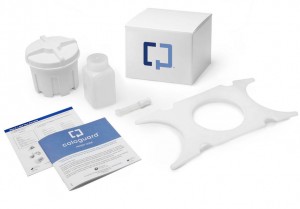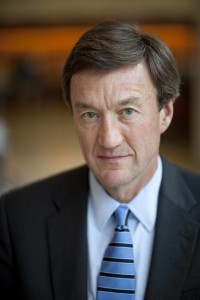-
Cancer
Exact Sciences and Mayo Clinic Extend, Expand Collaboration to Continue Fighting Cancer through Advanced Screening
Unique Arrangement Aims to Build on the Success of Cologuard®
Exact Sciences Corp. (NASDAQ: EXAS) and Mayo Clinic today announced a five-year extension and expansion of their collaboration, broadening their efforts to develop screening, surveillance and diagnostic tests beyond colorectal cancer to address other diseases within the gastrointestinal tract.
The amended agreement extends the collaboration for five more years with David Ahlquist, M.D., a Mayo Clinic gastroenterologist, and his lab at Mayo Clinic. Exact Sciences will continue to have rights to certain intellectual property, including patents, know-how and new markers.
 The original June 11, 2009 agreement between Exact Sciences and Mayo Clinic led to the development of Cologuard, which the U.S. Food and Drug Administration (FDA) approved on August 11, 2014. Cologuard is the first and only FDA-approved stool DNA-based colorectal cancer screening test.
The original June 11, 2009 agreement between Exact Sciences and Mayo Clinic led to the development of Cologuard, which the U.S. Food and Drug Administration (FDA) approved on August 11, 2014. Cologuard is the first and only FDA-approved stool DNA-based colorectal cancer screening test.
“This unique collaboration is producing powerful results,” said John Noseworthy, M.D., president and CEO of Mayo Clinic. “The success of our teams in developing Cologuard exemplifies what can happen when two organizations combine their expertise and unite toward a single goal.”
“By expanding our relationship with Mayo Clinic, we have an opportunity to build on our shared successes and continue looking for new opportunities to take on some of the deadliest forms of cancer,” said Kevin Conroy, CEO and chairman of Exact Sciences. “This collaboration and our ability to leverage both institutions’ distinctly different strengths is unique in American industry. But our ambitions cannot end with Cologuard. We expect our collaboration to continue producing breakthroughs that can change patients’ lives.”
MEDIA CONTACTS:
J.P. Fielder, Exact Sciences Corp. (202) 746 6352 Jfielder@exactsciences.com
Brian Kilen, Mayo Clinic 507-284-5005 newsbureau@mayo.edu
For more information about Cologuard, visit www.CologuardTest.com.
Disclosure statement - David Ahlquist, M.D., is a co-inventor of the technology that has been licensed to Exact Sciences from Mayo Clinic. Under that licensing agreement, Mayo Clinic and Dr. Ahlquist share in equity and royalties. Revenue Mayo Clinic receives is used to support Mayo's not-for-profit mission in patient care, education and research.
About Exact Sciences Corp.
Exact Sciences Corp. (NASDAQ: EXAS) is a molecular diagnostics company focused on the early detection and prevention of colorectal cancer. The company has exclusive intellectual property protecting its noninvasive, molecular screening technology for the detection of colorectal cancer. Stool DNA technology is included in the colorectal cancer screening guidelines of the American Cancer Society and the U.S. Multi-Society Task Force on Colorectal Cancer. For more information, please visit the company's website at www.exactsciences.com, follow us on Twitter @ExactSciences or find us on Facebook.
About Mayo Clinic
Mayo Clinic is a nonprofit organization committed to medical research and education, and providing expert, whole-person care to everyone who needs healing. For more information, visit http://www.mayoclinic.org/about-mayo-clinic or https://newsnetwork.mayoclinic.org/.
Certain statements made in this news release contain forward-looking statements within the meaning of Section 27A of the Securities Act of 1933, as amended, and Section 21E of the Securities and Exchange Act of 1934, as amended that are intended to be covered by the "safe harbor" created by those sections. Forward-looking statements can generally be identified by the use of forward-looking terms such as "believe," "expect," "may," "will," "should," "could," "seek," "intend," "plan," "estimate," "anticipate" or other comparable terms. All statements other than statements of historical facts included in this press release regarding our strategies, prospects, financial condition, operations, costs, plans and objectives are forward-looking statements. Examples of forward-looking statements include, among others, statements we make regarding expected future operating results, anticipated results of our sales and marketing efforts, expectations concerning payor reimbursement and the anticipated results of our product development efforts. Forward-looking statements are neither historical facts nor assurances of future performance. Instead, they are based only on our current beliefs, expectations and assumptions regarding the future of our business, future plans and strategies, projections, anticipated events and trends, the economy and other future conditions. Because forward-looking statements relate to the future, they are subject to inherent uncertainties, risks and changes in circumstances that are difficult to predict and many of which are outside of our control. Our actual results and financial condition may differ materially from those indicated in the forward-looking statements. Therefore, you should not rely on any of these forward-looking statements. Important factors that could cause our actual results and financial condition to differ materially from those indicated in the forward-looking statements include, among others, the following: our ability to successfully and profitably market our products; the acceptance of our products by patients and health care providers; the amount and nature of competition from other cancer screening products and procedures; our ability to maintain regulatory approvals and comply with applicable regulations; our success establishing and maintaining collaborative and licensing arrangements; our ability to successfully develop new products; and the other risks and uncertainties described in the Risk Factors and in Management's Discussion and Analysis of Financial Condition and Results of Operations sections of our most recently filed Annual Report on Form 10-K and our subsequently filed Quarterly Reports on Form 10-Q. We undertake no obligation to publicly update any forward-looking statement, whether written or oral, that may be made from time to time, whether as a result of new information, future developments or otherwise.







